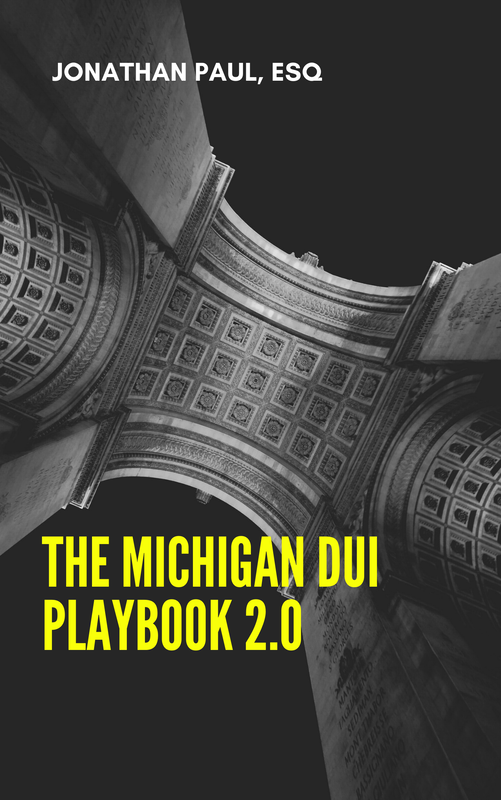|
As a former DUI prosecutor, I worked on 1000's of cases; the main piece of evidence was typically a chemical test, which was either a blood draw or a breath sample. In Michigan, the breath sample is collected with the Datamaster machine. Under Michigan law, the trier of fact is allowed to assume that the blood alcohol content result collected via chemical test was the same as when the driver was operating the vehicle.
As a former prosecutor my favorite lines were "over the legal limit" "more than double the legal limit" "he/she failed the test". I would push and push that chemical test being over the legal limit - what else was there to consider, the person was guilty! Anything that silly defense lawyer tells you is just smoke and mirrors - there was a test, and they failed it, end of story, find them guilty. Many prosecutors try to over-complicate the issue and act as if they need to defend the chemical test number - the more complicated you make it, the less a jury focuses on the "failed test" concept. As a prosecutor, I did the very opposite - make it as simple as possible - juries don't want to think too much, and if you spend so much time defending something, they lose confidence in the issue and question the reliability of the evidence. As a former prosecutor I had a different view of the blood vs breath results. In my experience, a blood test is considered to be more reliable by the "criminal law community", because well it's tested at the Michigan State Police lab, and there's supposedly less variables that can impact the result, because it is coming directly from your body. The person testifying about the result (lab tech) is also supposedly more knowledgeable and a better witness than a police officer who does the Datamaster machine. Both prosecutors and defense lawyers tend to give the blood result more weight and if it's over the legal limit for an OWI (0.08) or Super Drunk (0.17) then there's less incentive to challenge it. I completely disagree with this perception, and bring this mindset to my criminal defense practice. Here's why: 1. In Michigan, let's say the police stop my client at 2 am. A Datamaster result would usually happen within the hour of this traffic stop, and makes for a better argument when you're telling a jury to believe the BAC level is the same as when the person was driving the car. A blood test in contrast happens hours later at the hospital, or you have to wait for someone to come to the jail to draw the blood. Typically double or triple the time goes by - a good defense lawyer will jump on that argument. 2. Once the blood is drawn, it's supposed to be sealed in a tube for testing, but that sealed tube sits around and is transported to the lab over the course of a few days. Just picture that sealed blood sample bouncing around the mail truck as it heads to Lansing in an uncontrolled environment. Throw in freezing temperatures of winter or 95 degrees in August, and that sample is compromised. The best is when the lab tech brags about the sample being stored in a controlled environment prior to testing (but after bouncing around the mail truck in 95 degree weather for 3 days) - all I have to say is REASONABLE DOUBT. 3. It's a pain to get the lab tech to come to court to testify and limits your flexibility to set the case for trial. It's so much easier to have the police officer available to come in and testify. Sure a Datamaster has it's faults, but cops are trained not to know enough to be challenged. They have a procedure and if they follow it, that's it. They are not required to know how the machine works or why it does X, Y and Z but rather to follow steps. If the jury likes the cop and they believe he followed the steps then they will probably buy into the result and not find reasonable doubt. There's also usually two tests (not required), but the second result can confirm the first result vs a single blood test result. As a criminal defense lawyer, I find that prosecutors are more confident in the blood draw, but at trial those are easier to challenge. And the goal is not to show the test is wrong, faulty or an error, but rather just raise enough doubt to get a not-guilty verdict, and the door is wide open on the blood test. With the Datamaster, I am looking for numbers close to the limits of 0.08 and 0.17 as there are built in margins of error listed in the training manual for the operator. I am also looking for a police officer who is going to be chatty and give me open windows. Officers are trained not to discuss how the machine works or WHAT IF's but human nature makes most officers answer questions and be open to possibilities. If the officer answers YES IT"S POSSIBLE to enough questions then that's my reasonable doubt. After all it's a machine and the person pressing the buttons doesn't know how it works, why should be believe the result? The testing process in Michigan is only as good as the integrity of the sample, and there are a lot of issues with how these samples are collected, transported and stored.
The process works this way: the blood is drawn from the client, the blood is sealed in the Tri-Tech kit. The officer then mails the sample to the MSP lab. Once the sample is received, it is stored in a temperature controlled unit. So the sample is not temperature controlled for multiple days as it is tossed around as it travels from step to step. This is like leaving raw chicken out for 5 days, sticking it in the fridge for an hour then cooking it, and serving it to your kids. The so-called additives added to the sample to preserve the sample are delayed as it awaits the refrigeration process, which allows for metabolization of the glucose at 5-7 percent an hour if kept at room temperature. When was the last time a mail truck was room temperature in the hot summer or the below zero winter? Without the right controlled temperature, the fermentation process will begin and the sample is contaminated. Other than the absurd lack of temperature control, the vacuum seal must be 100 percent sealed; any fault in that seal and the sample is further in question. In Michigan, blood samples are tested by the Michigan State Police; the MSP use the flame ionization gas chromatograph blood analysis process. This process is considered to be reliable, but it has sources of error, uncertainty, and must be performed in a scientifically acceptable way.
The prosecutor is required by the constitution to produce the witness who conducted the analysis of the blood sample. This blood sample is not the entire sample, but rather a small portion of it. This small amount of blood is combined with t-butanol and n-propanol. The mixture is heated and a needle draws what is known as the “headspace” from the vial. Headspace is the gas space above the sample in a chromatography vial. Volatile sample components diffuse into the gas phase, forming the headspace gas. Headspace analysis is therefore the analysis of the components present in that gas. The headspace is then blown into a gas chromatograph by carrier gas, which for the MSP is helium. The vial is capped with a buta rubber stopper that the needle punctures to draw the headspace gas from the mixture. There are studies available that say not to use this rubber stopper, because it could absorb the organic compounds in the vial , which would alter the mix, which would compromise the sample. If this rubber stopper absorbs the t-butanol or the n-propanol, then the alcohol concentration will be higher in the sample. Along with the questionable use of the buta rubber stopper, the integrity of the concentration of the blood sample depends on the integrity of the vacuum seal of the initial blood collection from my client. Chemical solvents are used to maintain the blood from the point of the blood draw to the time when it enters the gas chromatograph process at the MSP lab. If this seal fails then the sample is contaminated. The administrative rules used by the MSP lab are actually less stringent than the accepted scientific principles. One alarming lack of stringency is the use of one controlled sample throughout the entire day instead of before and after each sample. This means that the machine is only tested when the doors open; if the machine is malfunctioning or not producing accurate results by lunch time, you’re going to have a full afternoon of questionable results, which should not be used as evidence in a criminal case. The MSP lab also does not follow the MIST 8-step protocol for use of an uncertainty budget aka sources of error. MSP’s explanation for not following the strictest protocols is practicality, which is not acceptable to me. When arrested for a DUI in Michigan, the police can pick from three different chemical tests; blood, urine or breath. A blood test can vary depending upon the purpose of the initial blood draw. When the blood is drawn, it could either be calculated as whole or serum blood. This is dangerous proposition for a client, because serum blood will come back at a higher BAC than whole blood. A conversion must be done in order to get an accurate result. The law requires that serum blood be converted to a whole blood equivalent.
The blood is usually serum when drawn for medical purposes, which is analyzed at the hospital rather than a criminal case, which is analyzed at a forensic laboratory; the blood will be serum if the blood is drawn to begin for purposes of a criminal case. A hospital uses an enzymatic method that tests blood serum; whole blood in comparison contains cellular material and proteins that clot. The difference in process comes down to hospitals will centrifugate whole blood, which means spinning it, which eliminates solids and leaves only a serum, which is a higher concentration, which results in a higher BAC level. Serum blood can contain 1.6 more alcohol than whole blood, which could turn a 0.07 to a 0.11, which is a major difference when working on a DUI case in Michigan. Any blood result attributed to my client in a Michigan DUI case is first examined to make sure we’re working with the whole blood number, and not an elevated serum number. Sometimes this requires contacting the hospital to obtain the documentation that occupied the blood result. I run into these sort of issues in accident cases where my client is rushed to the hospital for medical purposes, examined, treated and cared for, but not investigated and charged until the “medical” portion of the case is over. The hospital draws blood as part of their process, but not to prosecute, but rather to treat. Sometimes we need to convert this in order to protect my client from being prosecuted with an unfairly elevated number. Michigan Blood Draw - Get an Independent Test - will it hurt you or help you win your case?5/5/2016
In Michigan, the police will undoubtedly obtain a chemical test result from you either by breath, blood or urine. While that is usually the only test conducted in a DUI case, it doesn’t mean it’s the only one allowed.
In Michigan, a Defendant has the right to obtain their own independent blood test after the police have conducted as of the three tests. Many don’t even know this is a possibility, and for the most part the result will probably not vary, but if you have concerns about the integrity of the test, then you should consider this option. As you’re reading this book, it’s of course too late to go out and get a blood test, so this section of the book will focus on what happens if you DID request one, but you were not allowed to have it performed. If you requested an independent, and it was “reasonable”, the original test result won’t be suppressed, but it would be possible to get a jury instruction stating that the police violated the Defendant’s right to this test, and they can therefore assign whatever weight they want to this circumstance. It may be favorable to discredit the one chemical test by theorizing that a second test was an option, but the police denied this “double-check” opportunity. It’s certainly a way to get creative with one’s arguments. Of course the one downside of requesting an independent exam is the result coming back close to the original, or potentially higher. In this situation, you would have the mandated test comes back at let’s say 0.17, and now you request your own, and it comes back at 0.17 or 0.19. Any good prosecutor can now argue that the first test was accurate, and given a chance to confirm the result, it came back accurate on the second - this was a test that the Defendant asked for, and you have the same or higher result; most if not all doors of discrediting the tests are closed by a confirming test. If you’re arrested for a DUI in Michigan, a police officer gets to select which of the three chemical tests you need to take to comply with the Implied Consent law. If you refuse the officer, he/she can obtain a warrant for a blood draw at a local medical facility. This then triggers the Implied Consent license sanctions, which I discuss in another section of this book. For now, let’s just look at how one can challenge a search warrant, which lead to a blood draw result. If successful, the result itself would not be admissible against you.
In Michigan, the standard to obtain a search warrant for a blood draw is probable cause that the person to be tested committed a DUI offense as outlined in the Motor Vehicle Code. Essentially an officer needs to piece together his observations, tests conducted and the circumstances to ask a judge or magistrate to sign an order to compel a blood draw. Without the probable cause, a warrant will not be issued, and if it is, and it is challenged, the results would not be admissible. One piece of evidence commonly relied upon by the police to obtain a search warrant is a PBT result. Although not admissible at trial, it is admissible for purposes of justifying an arrest and seeking a warrant for a blood draw. Other factors would be statements by the Defendant about consumption of alcohol or drugs, observations by the police, and performance on field sobriety tests. Obtaining the video and audio from the incident is helpful in “challenging” these elements, which lead to the issuance of the warrant. If we can show that the puzzle, which was pieced together to get the search warrant doesn’t quite fit together than we stand a good chance of challenging the warrant. It then becomes a situation where we all know the BAC level was potentially over the limit, but because of a technicality, it may not be admissible against you. This doesn’t mean your case is dismissed based on this, but the prosecutor would need to go forward without their most powerful piece of evidence, and may look to make a deal, or could get beat at a trial. In Michigan, we're beginning to see more and more blood testing rather than use of the DataMaster. If someone is arrested and refuses the a breath test, the police officer will then seek a warrant for a blood test. This also means that a one-year license suspension will be triggered, and it's imperative to review the Implied Consent Law. These warrants are almost always granted by judges around the state.
You may also be taken for a blood draw if you've been involved in an accident or there is an allegation of a serious injury or death to another. Police departments will regularly admit that a blood test is more accurate, so these tests are done in the most serious cases. If the police begin with the blood test, the Implied Consent Law will not be applicable. In order for the prosecutor to admit blood results into evidence at a DUI trial in Michigan, the prosecutor must produce the person who drew the blood, and this witness must confirm the following: - the blood sample was taken in a timely manner; - the sample was from a particular person; - the sample was taken by an authorized licensed physician, a medical technologist, or a registered nurse designated by a licensed physician; - sterilized instruments were used; - the sample was properly preserved and labeled; - proper methods of transportation were used; - procedures used in the test sample withdrawal were proper; and - the identity of the supervising person, under whose care the sample was withdrawn, was established. In Michigan, a proper DUI blood test test procedure requires use of a control sample, a test sample, and two analyses of the test sample. A test sample is a sample of the substance at a known concentration, such as a known ethyl alcohol concentration in blood. A control sample contains all of the substances normally found in the matter to be tested, except for the substance of interest, ethyl alcohol. The purpose of the control sample is to demonstrate that the test instrument will not show a result based on substances common in the matter tested, thus giving a false result. For blood, the control sample is blood without alcohol. Blood testing can be conducted with three different methods: Dichromate procedure, enzymatic procedure or gas chromatography. Gas chromatography is the method currently used in Michigan for testing samples of blood for cases involving operating while intoxicated and operating with the presence of a controlled substance. Whenever blood is drawn in a DUI case, your attorney should demand the sample of the withdrawn blood along with all the associated paperwork, which provides valuable information, which could be fruitful on cross-examination. The request for a sample must be demanded from the state police lab within 30 days of the date the state completed its test. The state police lab may discard biological specimens 180 days after reporting its results. This second blood sample can be tested by an independent laboratory, but this should be done with caution; a second test can only strengthen the results of the first test, but could also cast doubt on the initial results. In Michigan, a defendant has the right to an independent blood test after the police breath test or even the police blood test. If you have any concerns about the integrity of the test, you should consider having your own test conducted.
Moreover, if the police deny your client’s reasonable request for the independent blood test, the jury will receive an instruction that the police violated the defendant’s statutory right to get an independent test. |
Click to Email Me Categories
All
|
Ann Arbor Office LocationPlymouth Office Location |
Representing DUI Clients in MichiganRepresenting clients charged with a DUI in Ann Arbor, Canton, Brighton, Howell, Saline, Adrian, Taylor, Plymouth, Northville, Westland, Ypsilanti, Pittsfield Towsnhip, Warren, Sterling Heights, Farmington, Pontiac, Romulus, Lansing, Novi, South Lyon, Southfield, Birmingham, Bloomfield Hills, Royal Oak, Troy, Rochester, Jackson, East Lansing, Garden City, Livonia, Dearborn, Detroit, St Clair Shores, Hazel Park, Ferndale, Madison Heights, Waterford, Milford, Shelby Township Clarkston, Oak Park, Berkley, Fraser, Sterling Heights, Clinton Township and others throughout Washtenaw, Wayne, Monroe, Jackson, Genesee, Macomb, Ingham, Lenawee, Livingston and Oakland County.
|







